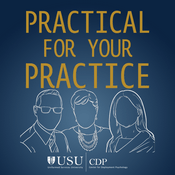Obsessive-Compulsive Disorder (OCD) is common, disabling and frequently misunderstood in clinical practice. In this episode of Practical for Your Practice, hosts Dr. Jenna Ermold and Kevin Holloway are joined by Dr. Elizabeth McIngvale and Dr. Lauren Wadsworth, two nationally recognized leaders in OCD treatment and training, for a deep dive into Exposure and Response Prevention (ERP), the gold-standard treatment for OCD.
Together, they unpack why OCD is so often misdiagnosed, mistreated, or unintentionally reinforced, even by well-intentioned clinicians, and how ERP works to interrupt the obsession–compulsion cycle by targeting avoidance, ritualizing, and intolerance of uncertainty.
Be sure to listen in and remember, we want to hear from you! Have thoughts about this episode? A “clinical sin” you’ve encountered? Ideas for future topics or guests?
Leave us a voicemail via SpeakPipe https://www.speakpipe.com/cdpp4p Or send us an email
[email protected] . We love hearing from our listeners.
As always, until next time, stay curious, and mind your EBPs.
Elizabeth McIngvale, Ph.D., LCSW, is the Director of the OCD Institute of Texas, Co-Founder of MHNTI, and faculty at Baylor College of Medicine. A renowned OCD expert, she has published 35+ peer-reviewed works and delivered 250+ lectures. She founded the Peace of Mind Foundation and OCDChallenge.org, now part of the IOCDF, where she serves as a Board Member and former national spokesperson. Diagnosed with OCD at age 12, Dr. McIngvale brings a unique dual perspective as both a clinician and advocate. She has advised NIH and SAMHSA and serves as a faculty instructor for the Behavioral Therapy Training Institute. She remains dedicated to advancing research and expanding access to high-quality care for OCD and anxiety disorders.
Dr. Lauren Wadsworth is a board-certified clinical psychologist and Clinical Senior Instructor at the University of Rochester Medical Center. She is the founding director of Genesee Valley Psychology (GVP), providing accessible evidence-based care in Western NY, and Meridian Psychology Practice, serving NY, MA, and GA. As a leader in mental health education, she co-founded the Mental Health National Training Institute (MHNTI) and Twin Stars Diversity Trainers. An expert in diversity and inclusion, she co-authored Did That Just Happen?! Beyond "Diversity" — Creating Sustainable and Inclusive Organizations. Dr. Wadsworth is dedicated to expanding access to evidence-based treatment and fostering inclusive environments through app-based training and organizational consultation.
Resources mentioned in this episode:
Mental Health Network & Training Institute (MHNTI) Evidence-based training and consultation for OCD and related disorders https://mhnti.com
International OCD Foundation (IOCDF) Clinician training, resources, and treatment referrals https://iocdf.org
Calls-to-action:
Subscribe to the Practical for Your Practice Podcast
Submit your comments or questions on our social media pages or via Speakpipe
Subscribe to The Center for Deployment Psychology Monthly Email



